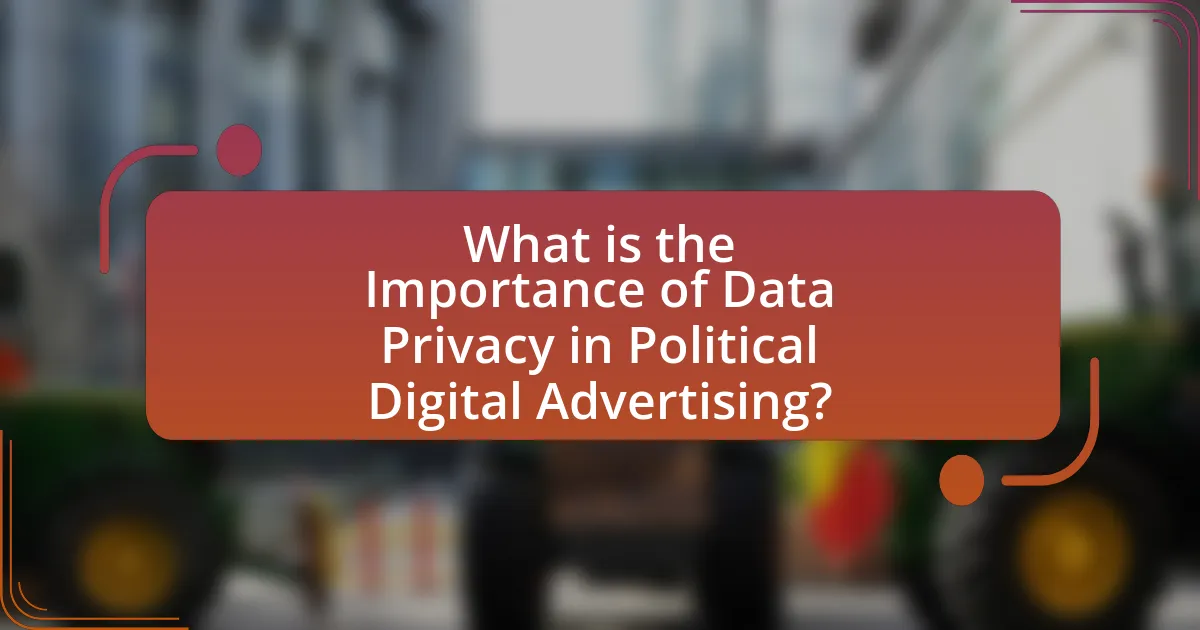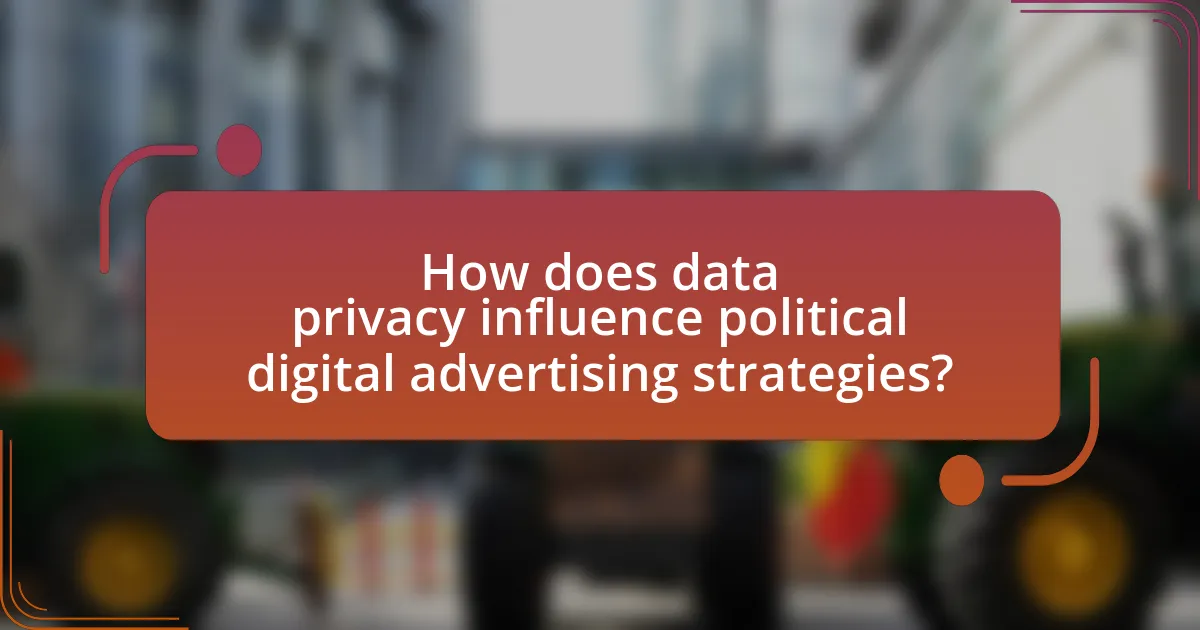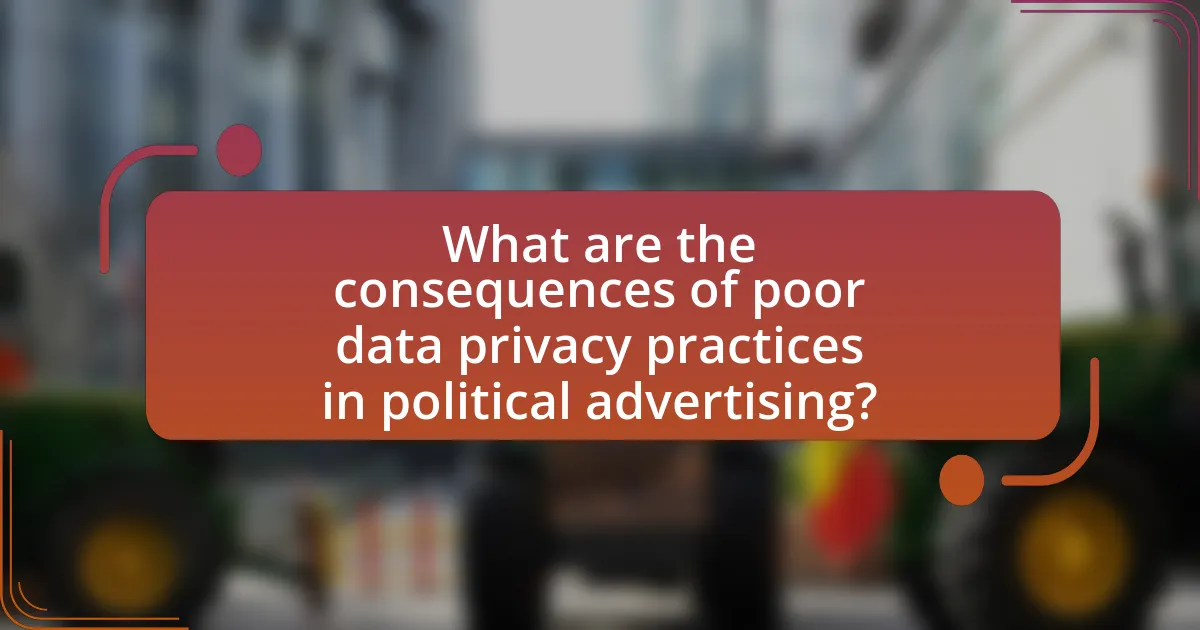Data privacy is a critical aspect of political digital advertising, as it safeguards individuals’ personal information and upholds trust in the electoral process. The article examines the significance of data privacy, highlighting the risks associated with neglecting it, such as voter manipulation and loss of public trust. It discusses key principles of data privacy relevant to political advertising, including consent and transparency, and outlines legal frameworks like the General Data Protection Regulation (GDPR) that govern data usage. Furthermore, the article emphasizes the ethical considerations shaping data privacy practices and the impact of data privacy on voter engagement and campaign strategies. Lastly, it provides best practices for political campaigns to ensure compliance with data privacy regulations and maintain voter confidence.

What is the Importance of Data Privacy in Political Digital Advertising?
Data privacy is crucial in political digital advertising because it protects individuals’ personal information and maintains trust in the electoral process. When political campaigns utilize data for targeted advertising, they often collect sensitive information about voters, which can lead to misuse or unauthorized access if not properly safeguarded. According to a 2020 report by the Pew Research Center, 81% of Americans feel they have little to no control over the data collected about them, highlighting the public’s concern regarding data privacy. Ensuring data privacy not only complies with regulations like the General Data Protection Regulation (GDPR) but also fosters transparency and accountability in political messaging, ultimately supporting a healthier democratic process.
Why is data privacy crucial in the context of political digital advertising?
Data privacy is crucial in the context of political digital advertising because it protects individuals’ personal information from misuse and manipulation. The collection and analysis of personal data enable political campaigns to target voters with tailored messages, but without stringent data privacy measures, this practice can lead to unethical behavior, such as voter profiling and misinformation. For instance, the Cambridge Analytica scandal highlighted how personal data was exploited to influence electoral outcomes, raising significant concerns about consent and transparency. Ensuring data privacy fosters trust between voters and political entities, which is essential for a healthy democratic process.
What are the potential risks of neglecting data privacy in political campaigns?
Neglecting data privacy in political campaigns poses significant risks, including voter manipulation, loss of public trust, and legal repercussions. Voter manipulation can occur when campaigns exploit personal data to target individuals with misleading information, as seen in the Cambridge Analytica scandal, where data from millions of Facebook users was used to influence voter behavior. Loss of public trust can result from perceived invasions of privacy, leading to decreased voter engagement and support; a 2020 survey indicated that 79% of Americans expressed concern about how their data is used by political entities. Legal repercussions may arise from violations of data protection laws, such as the General Data Protection Regulation (GDPR) in Europe, which imposes hefty fines for non-compliance. These risks highlight the critical need for robust data privacy measures in political digital advertising.
How does data privacy impact voter trust and engagement?
Data privacy significantly impacts voter trust and engagement by influencing perceptions of security and transparency in the electoral process. When voters believe their personal information is protected, they are more likely to participate in elections and engage with political campaigns. A study by the Pew Research Center found that 79% of Americans are concerned about how their data is used by companies, which extends to political advertising. This concern can lead to skepticism about the motives behind campaign communications, potentially decreasing voter turnout if individuals feel their data is mishandled or exploited. Thus, ensuring robust data privacy measures can enhance voter confidence and encourage higher levels of civic participation.
What are the key principles of data privacy relevant to political advertising?
The key principles of data privacy relevant to political advertising include consent, transparency, data minimization, purpose limitation, and security. Consent requires obtaining explicit permission from individuals before collecting or using their personal data for political advertising. Transparency mandates that organizations clearly inform users about how their data will be used, including the types of data collected and the purposes for which it will be utilized. Data minimization emphasizes collecting only the data necessary for the intended purpose, reducing the risk of misuse. Purpose limitation restricts the use of personal data to the specific purposes for which it was collected, preventing unauthorized use. Lastly, security involves implementing measures to protect personal data from unauthorized access and breaches, ensuring that individuals’ information remains confidential and secure. These principles are essential for maintaining trust and compliance with regulations such as the General Data Protection Regulation (GDPR) in the European Union, which enforces strict data privacy standards.
What legal frameworks govern data privacy in political advertising?
The legal frameworks governing data privacy in political advertising include the General Data Protection Regulation (GDPR) in the European Union, the California Consumer Privacy Act (CCPA) in the United States, and various national and state-level privacy laws. GDPR mandates strict consent requirements for data processing and grants individuals rights over their personal data, while CCPA provides California residents with rights to know, delete, and opt-out of the sale of their personal information. These regulations aim to protect consumer privacy and ensure transparency in how personal data is used in political campaigns.
How do ethical considerations shape data privacy practices in political campaigns?
Ethical considerations significantly shape data privacy practices in political campaigns by establishing standards for transparency, consent, and accountability. Political campaigns are increasingly scrutinized for how they collect, store, and utilize personal data, leading to the implementation of practices that prioritize voter privacy and informed consent. For instance, the General Data Protection Regulation (GDPR) in Europe mandates that organizations, including political entities, obtain explicit consent from individuals before processing their personal data, thereby reinforcing ethical standards in data handling. Additionally, ethical frameworks encourage campaigns to avoid manipulative tactics that exploit personal information, fostering trust and integrity in the electoral process. This alignment of ethical considerations with data privacy practices ultimately aims to protect voter rights and enhance democratic engagement.

How does data privacy influence political digital advertising strategies?
Data privacy significantly influences political digital advertising strategies by shaping how campaigns collect, use, and target voter data. Political campaigns must navigate regulations such as the General Data Protection Regulation (GDPR) in Europe and the California Consumer Privacy Act (CCPA) in the U.S., which impose strict guidelines on data collection and user consent. These regulations compel campaigns to adopt more transparent data practices, limiting their ability to utilize extensive personal data for micro-targeting. For instance, a study by the Pew Research Center found that 79% of Americans are concerned about how their data is used by advertisers, prompting political campaigns to prioritize ethical data usage to maintain voter trust. Consequently, campaigns are increasingly focusing on broader messaging strategies rather than hyper-targeted ads, as they seek to comply with privacy laws while still effectively reaching potential voters.
What role does data collection play in shaping political advertising?
Data collection plays a crucial role in shaping political advertising by enabling targeted messaging to specific voter demographics. Political campaigns utilize data analytics to gather information on voter preferences, behaviors, and demographics, allowing them to tailor their advertisements for maximum impact. For instance, a study by the Pew Research Center found that 62% of Americans believe that targeted ads are effective in influencing their political opinions. This targeted approach not only increases engagement but also enhances the efficiency of campaign spending by focusing resources on the most receptive audiences.
How can political advertisers balance data collection with privacy concerns?
Political advertisers can balance data collection with privacy concerns by implementing transparent data practices and obtaining informed consent from users. Transparency involves clearly communicating what data is collected, how it will be used, and ensuring that users have control over their information. For instance, the General Data Protection Regulation (GDPR) in Europe mandates that organizations must obtain explicit consent from individuals before processing their personal data, which has led to more responsible data handling practices. Additionally, advertisers can utilize anonymization techniques to protect individual identities while still gathering valuable insights. Research shows that 79% of consumers are concerned about how their data is used, highlighting the necessity for advertisers to prioritize privacy to maintain trust and compliance with regulations.
What types of data are most commonly used in political digital advertising?
Political digital advertising commonly utilizes demographic data, behavioral data, psychographic data, and geographic data. Demographic data includes age, gender, income, and education level, which help campaigns target specific voter segments. Behavioral data tracks online activities, such as website visits and social media interactions, allowing advertisers to understand user engagement. Psychographic data focuses on personality traits, values, and interests, enabling campaigns to tailor messages that resonate with voters. Geographic data provides location-based insights, helping campaigns to target audiences in specific regions or districts. These data types are essential for creating effective and personalized advertising strategies in political campaigns.
How can political campaigns ensure compliance with data privacy regulations?
Political campaigns can ensure compliance with data privacy regulations by implementing robust data management practices and adhering to legal frameworks such as the General Data Protection Regulation (GDPR) and the California Consumer Privacy Act (CCPA). These regulations require campaigns to obtain explicit consent from individuals before collecting their personal data, provide transparency about data usage, and allow individuals to access or delete their data upon request. For instance, a study by the International Association of Privacy Professionals (IAPP) highlights that organizations that prioritize data privacy not only comply with regulations but also build trust with their constituents, which is crucial in political contexts.
What steps should campaigns take to protect voter data?
Campaigns should implement robust data protection measures to safeguard voter data. This includes encrypting sensitive information, ensuring secure data storage, and limiting access to authorized personnel only. Additionally, campaigns must comply with data protection regulations such as the General Data Protection Regulation (GDPR) and the California Consumer Privacy Act (CCPA), which mandate transparency in data collection and usage. Regular audits and vulnerability assessments can further enhance data security by identifying potential risks. According to a 2020 report by the Pew Research Center, 79% of Americans are concerned about how their data is used, highlighting the necessity for campaigns to prioritize voter data protection to maintain public trust.
How can transparency in data usage enhance voter confidence?
Transparency in data usage enhances voter confidence by fostering trust in the electoral process. When voters are informed about how their data is collected, stored, and utilized, they feel more secure that their personal information is being handled responsibly. For instance, a study by the Pew Research Center found that 79% of Americans are concerned about how their data is used by companies, indicating a strong desire for transparency. By implementing clear data usage policies and openly communicating these practices, political entities can alleviate fears of misuse and manipulation, thereby reinforcing voter trust in the integrity of the electoral system.

What are the consequences of poor data privacy practices in political advertising?
Poor data privacy practices in political advertising can lead to significant consequences, including voter manipulation, loss of public trust, and potential legal repercussions. Voter manipulation occurs when personal data is misused to target individuals with misleading or deceptive information, influencing their voting behavior. For instance, the Cambridge Analytica scandal demonstrated how improperly accessed data was used to sway electoral outcomes, highlighting the risks of inadequate privacy measures. Additionally, when political campaigns fail to protect user data, they risk losing public trust, which can diminish voter engagement and participation in the democratic process. A 2020 survey indicated that 79% of Americans expressed concern about how their data is used in political advertising, underscoring the importance of maintaining data privacy to uphold democratic integrity. Lastly, poor data privacy practices can result in legal consequences, as regulations like the General Data Protection Regulation (GDPR) impose strict penalties for data breaches, which can financially burden political organizations.
What are the potential legal repercussions for violating data privacy laws?
Violating data privacy laws can lead to significant legal repercussions, including hefty fines, civil lawsuits, and criminal charges. For instance, under the General Data Protection Regulation (GDPR), organizations can face fines of up to 4% of their annual global turnover or €20 million, whichever is higher, for non-compliance. Additionally, individuals whose data rights have been violated may file lawsuits for damages, further increasing the financial liability for the offending entity. In the United States, various state laws, such as the California Consumer Privacy Act (CCPA), impose penalties that can reach $7,500 per violation, emphasizing the serious consequences of failing to adhere to data privacy regulations.
How can breaches of data privacy affect a political campaign’s reputation?
Breaches of data privacy can severely damage a political campaign’s reputation by eroding public trust and raising concerns about ethical conduct. When sensitive voter information is compromised, it can lead to negative media coverage, public backlash, and a perception of incompetence or malfeasance within the campaign. For instance, the Cambridge Analytica scandal in 2018 highlighted how unauthorized access to personal data not only harmed the reputation of the involved political entities but also influenced voter sentiment and behavior, resulting in long-lasting reputational damage. Such incidents demonstrate that data privacy breaches can have immediate and far-reaching consequences for political campaigns, affecting their credibility and overall effectiveness.
What lessons can be learned from past data privacy scandals in political advertising?
Past data privacy scandals in political advertising highlight the critical need for transparency, accountability, and robust data protection measures. For instance, the Cambridge Analytica scandal revealed how personal data was harvested without consent to influence voter behavior, leading to widespread calls for stricter regulations. This incident underscored the importance of obtaining explicit consent from individuals before using their data for political purposes. Additionally, it demonstrated the necessity for political entities to be transparent about their data practices and the sources of their information. The fallout from these scandals has prompted legislative actions, such as the General Data Protection Regulation (GDPR) in Europe, which emphasizes the protection of personal data and the rights of individuals. These lessons stress that failure to prioritize data privacy can result in significant reputational damage and legal consequences for political organizations.
What best practices should political campaigns adopt for data privacy?
Political campaigns should adopt best practices such as obtaining explicit consent from individuals before collecting their data, ensuring transparency about data usage, and implementing robust security measures to protect personal information. Explicit consent is crucial as it aligns with regulations like the General Data Protection Regulation (GDPR), which mandates that individuals must agree to data collection. Transparency fosters trust, allowing voters to understand how their data will be used, which can enhance engagement. Additionally, employing strong security protocols, such as encryption and regular security audits, helps safeguard against data breaches, which have been shown to damage public trust in political entities. For instance, a study by the Pew Research Center found that 79% of Americans are concerned about how their data is being used by companies and organizations, highlighting the importance of these practices in maintaining voter confidence.
How can campaigns effectively communicate their data privacy policies to voters?
Campaigns can effectively communicate their data privacy policies to voters by utilizing clear, concise language and accessible formats. This approach ensures that voters understand how their data will be collected, used, and protected. For instance, campaigns can create straightforward privacy notices that highlight key points, such as data collection methods and user rights, which can be shared through various channels like websites, social media, and email newsletters. Research indicates that transparency in data practices builds trust; a study by the Pew Research Center found that 79% of Americans are concerned about how their data is used by companies. By addressing these concerns directly and providing easy-to-understand information, campaigns can foster a sense of security among voters regarding their personal information.
What tools and technologies can assist in maintaining data privacy in political advertising?
Tools and technologies that assist in maintaining data privacy in political advertising include encryption software, anonymization tools, and privacy-focused data management platforms. Encryption software secures data by converting it into a coded format, making it inaccessible to unauthorized users. Anonymization tools remove personally identifiable information from datasets, ensuring that individual identities cannot be traced back to the data. Privacy-focused data management platforms, such as those compliant with GDPR and CCPA regulations, provide frameworks for collecting, storing, and processing data while prioritizing user consent and transparency. These technologies collectively enhance data privacy by safeguarding sensitive information and ensuring compliance with legal standards.




